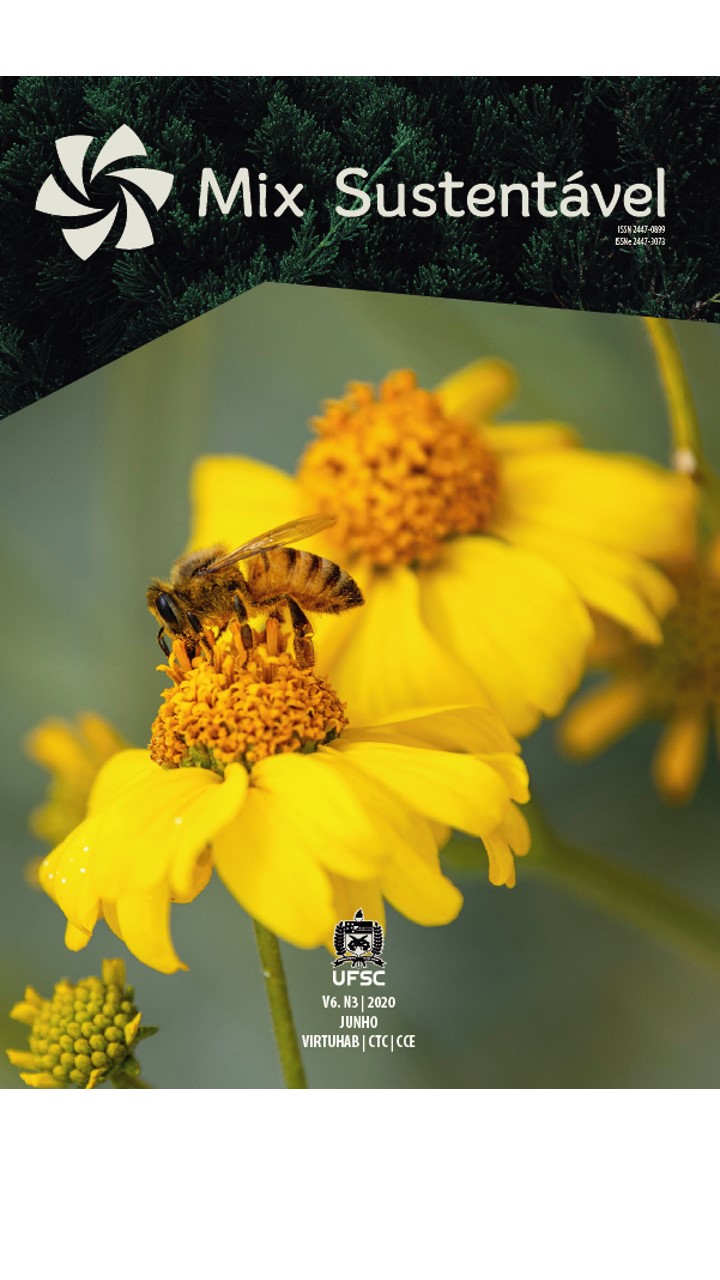SUSTENTABILIDADE ENERGÉTICA EM ESCOLA PÚBLICA
DOI:
https://doi.org/10.29183/2447-3073.MIX2020.v6.n3.37-44Palavras-chave:
Tecnologia fotovoltaica. Sustentabilidade energética. Viabilidade, Escola pública.Resumo
Estabelecimentos de ensino públicos e privados apresentam-se como cenários oportunos para a busca de sustentabilidade energética. No Brasil, a tecnologia fotovoltaica se destaca devido aos índices elevados de radiação e a possibilidade de integrar com a rede elétrica tradicional. Uma pesquisa foi realizada com o objetivo de avaliar a viabilidade técnica e econômica para a instalação de painéis solares fotovoltaicos em dois estabelecimentos de ensino em Concórdia (SC). Para os cálculos foram considerados valores orçamentários junto a fornecedor da tecnologia e dados coletados nas edificações em estudo. Foi relacionado consumo de eletricidade nas edificações e condições físicas dos estabelecimentos, como possível posição, disposição dos painéis na cobertura e viabilidade econômica. Os valores de investimentos iniciais apresentados por fornecedor da tecnologia equacionaram resultados semelhantes, para retorno financeiro após quatro anos de instalação, com maior viabilidade na edificação de maior consumo. Com o estudo concluímos que o empreendimento de maior consumo de energia elétrica, com grandes áreas de cobertura, demonstrou ser mais viável para o uso dessa tecnologia.
Referências
BIFFI, E.; REIS, M. A. F. Estudo de viabilidade de usina solar fotovoltaica em posto de combustível na cidade de Ipumirim. VII Encontro de Sustentabilidade em Projeto. Anais...Florianópolis: UFSC, 2019Disponível em: <http://ensus2019.paginas.ufsc.br/anais-ensus-2019/>. Acesso em: 10 maio. 2019.
CARVALHO, F. I. A. DE; ABREU, M. C. S. DE; CORREIA NETO, J. F. Financial Alternatives to Enable Distributed Microgeneration Projects With Photovoltaic Solar Power. RAM. Revista de Administração Mackenzie, v. 18, n. 1, p. 120–147, fev. 2017.
DARK, M. L. A photovoltaics module for incoming science, technology, engineering and mathematics undergraduates. Physics Education, v. 46, n. 3, p. 303–308, maio 2011.
KORHONEN, J.; HONKASALO, A.; SEPPÄLÄ, J. Circular Economy: The Concept and its Limitations. Ecological Economics, v. 143, n. January, p. 37–46, 2018.
MELO, A. G. et al. Development of a closed and open loop solar tracker technology. Acta Scientiarum. Technology, v. 39, n. 2, p. 177, 15 maio 2017.
NAYAK, S. et al. Energy matrices analysis of hybrid PVT greenhouse dryer by considering various silicon and non-silicon PV modules. International Journal of Sustainable Energy, v. 33, n. 2, p. 336–348, 2014.
PAINES, P. DE A.; VIGNOCHI, L.; POSSAMAI, O. Simulação de sistema fotovoltaico para o setor comercial. Exacta, v. 16, n. 3, p. 17–30, 27 set. 2018.
REIS, M. A. F. Efeito fotoelétrico na produção e transformação da luz: investigação do uso de uma proposta didática para o ensino de física em cursos de Engenharia. Canoas: ULBRA, 2019.
REIS, M. A. F.; SERRANO, A. Pesquisa bibliográfica em historicidade, conceitos e contextos na produção e transformação da luz com a teoria quântica. Acta Scientiae, v. 19, n. 3, p. 493–516, 2017.
SALAMONI, I. T.; RÜTHER, R.; ZILLES, R. Uma oportunidade para o desenvolvimento da indústria fotovoltaica no Brasil: eletricidade solar para os telhados. Parcerias Estratégicas (CGEE), v. 14, n. 28, p. 219–243, 2009.
SOUZA, A. C. G. DE; MACHADO, B. G. DE F. Sistemas fotovoltaicos de micro e minigeração distribuídas: mecanismos de incentivos e perspectivas de expansão à luz da Resolução Normativa no 482 / 2012 da Aneel. Caderno de Finanças Públicas, v. 1, n. 16, p. 387–410, 2016.
Downloads
Publicado
Edição
Seção
Licença
Aviso de Direito Autoral Creative Commons
1. Política para Periódicos de Acesso Livre
Autores que publicam nesta revista concordam com os seguintes termos:
a. Autores mantém os direitos autorais e concedem à revista o direito de primeira publicação, com o trabalho simultaneamente licenciado sob a Licença Creative Commons Attribution que permite o compartilhamento do trabalho com reconhecimento da autoria e publicação inicial nesta revista.
b. Autores têm autorização para assumir contratos adicionais separadamente, para distribuição não-exclusiva da versão do trabalho publicada nesta revista (ex.: publicar em repositório institucional ou como capítulo de livro), com reconhecimento de autoria e publicação inicial nesta revista.
c. Autores têm permissão e são estimulados a publicar e distribuir seu trabalho online (ex.: em repositórios institucionais ou na sua página pessoal) a qualquer ponto após o processo editorial, já que isso pode gerar alterações produtivas, bem como aumentar o impacto e a citação do trabalho publicado (Veja O Efeito do Acesso Livre).




